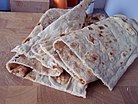| Revision as of 08:58, 25 February 2020 edit87.101.224.226 (talk)No edit summary← Previous edit | Revision as of 09:00, 25 February 2020 edit undo87.101.224.226 (talk)No edit summaryNext edit → | ||
| Line 14: | Line 14: | ||
| | other = | | other = | ||
| }} | }} | ||
| '''Sheermal''' or '''Shirmal''' (]-]: {{nq|شیرمال}}, {{lang-hi|शीरमल}}), is a ]-flavored traditional ] from ].<ref>{{cite web|url=https://www.foodaholic.biz/sheermal-persian-sweet-bread/|title=Sheermal, Persian Sweet Bread|publisher=|accessdate=5 October 2014}}</ref> The word sheermal is derived from the Persian words شیر (] sheer) meaning milk, and مالیدن (] malidan) meaning to rub. In a literal translation, sheermal means milk rubbed. After being introduced to North India by the Persianate ] emperors. It became a delicacy of ],] and ].<ref>{{cite web|url=http://www.hindu.com/thehindu/mp/2003/05/29/stories/2003052900410300.htm|title=The Hindu : A nawabi affair|publisher=|accessdate=5 October 2014}}</ref> It is also part of the ]<ref>{{cite web|url=http://www.hindu.com/mp/2007/07/21/stories/2007072152370400.htm|title=A slice of the Awadh exotica|work=The Hindu|accessdate=5 October 2014}}</ref> and is enjoyed in Old Bhopal. | '''Sheermal''' or '''Shirmal''' (]-]: {{nq|شیرمال}}, {{lang-hi|शीरमल}}), is a ]-flavored traditional ] from ].<ref>{{cite web|url=https://www.foodaholic.biz/sheermal-persian-sweet-bread/|title=Sheermal, Persian Sweet Bread|publisher=|accessdate=5 October 2014}}</ref> The word sheermal is derived from the Persian words شیر (] sheer) meaning milk, and مالیدن (] malidan) meaning to rub. In a literal translation, sheermal means milk rubbed. After being introduced to North India by the Persianate ] emperors. It became a delicacy of ],] and ].<ref>{{cite web|url=http://www.hindu.com/thehindu/mp/2003/05/29/stories/2003052900410300.htm|title=The Hindu : A nawabi affair|publisher=|accessdate=5 October 2014}}</ref> It is also part of the ]<ref>{{cite web|url=http://www.hindu.com/mp/2007/07/21/stories/2007072152370400.htm|title=A slice of the Awadh exotica|work=The Hindu|accessdate=5 October 2014}}</ref> and is enjoyed in Old Bhopal. | ||
| ==Preparation== | ==Preparation== | ||
Revision as of 09:00, 25 February 2020
 Sheermal served in Iran. Sheermal served in Iran. | |
| Alternative names | Shirmal |
|---|---|
| Place of origin | Iran |
| Region or state | Greater Iran, later spread to North India with the arrival of Persianate Mughal rulers |
| Main ingredients | Maida, Milk, Ghee, Saffron |
Sheermal or Shirmal (Persian-Urdu: شیرمال, Template:Lang-hi), is a saffron-flavored traditional flatbread from Greater Iran. The word sheermal is derived from the Persian words شیر (translit. sheer) meaning milk, and مالیدن (translit. malidan) meaning to rub. In a literal translation, sheermal means milk rubbed. After being introduced to North India by the Persianate Mughal emperors. It became a delicacy of Lucknow,Hyderabad and Aurangabad. It is also part of the Awadhi cuisine and is enjoyed in Old Bhopal.
Preparation
Sheermal is a mildly sweet naan made out of maida, leavened with yeast, baked in a tandoor or oven. Sheermal was traditionally made like roti. Today, sheermal is prepared like naan. The warm water in the recipe for naan roti was replaced with warm milk sweetened with sugar and flavored with saffron and cardamom. The final product resembles Danish pastry.
In Iran, there are slight regional variations in the preparation of sheermal. As such, sheermal is sometimes used as a souvenir when travelling between the regions.
Sheermal is sometimes served with Lucknow kababs or alongside nihari.
See also
References
- "Sheermal, Persian Sweet Bread". Retrieved 5 October 2014.
- "The Hindu : A nawabi affair". Retrieved 5 October 2014.
- "A slice of the Awadh exotica". The Hindu. Retrieved 5 October 2014.
| Indian breads | |
|---|---|
| List of Indian breads | |
| Pakistani breads | |
|---|---|
| List of Pakistani breads | |
| Iranian breads | |
|---|---|
